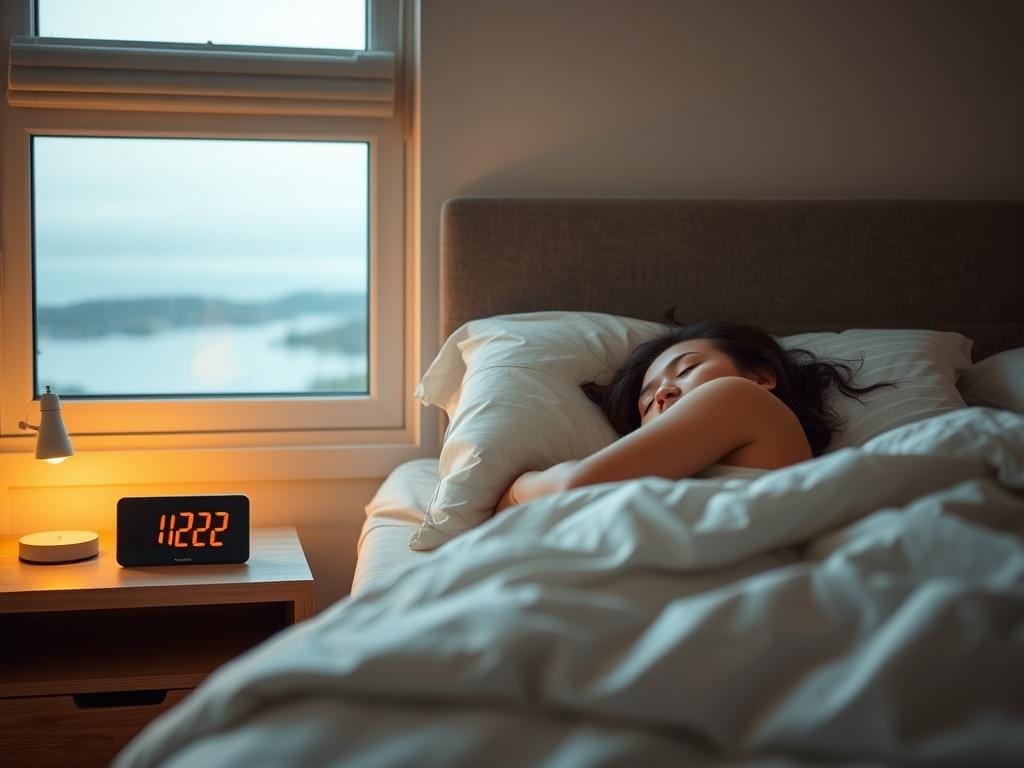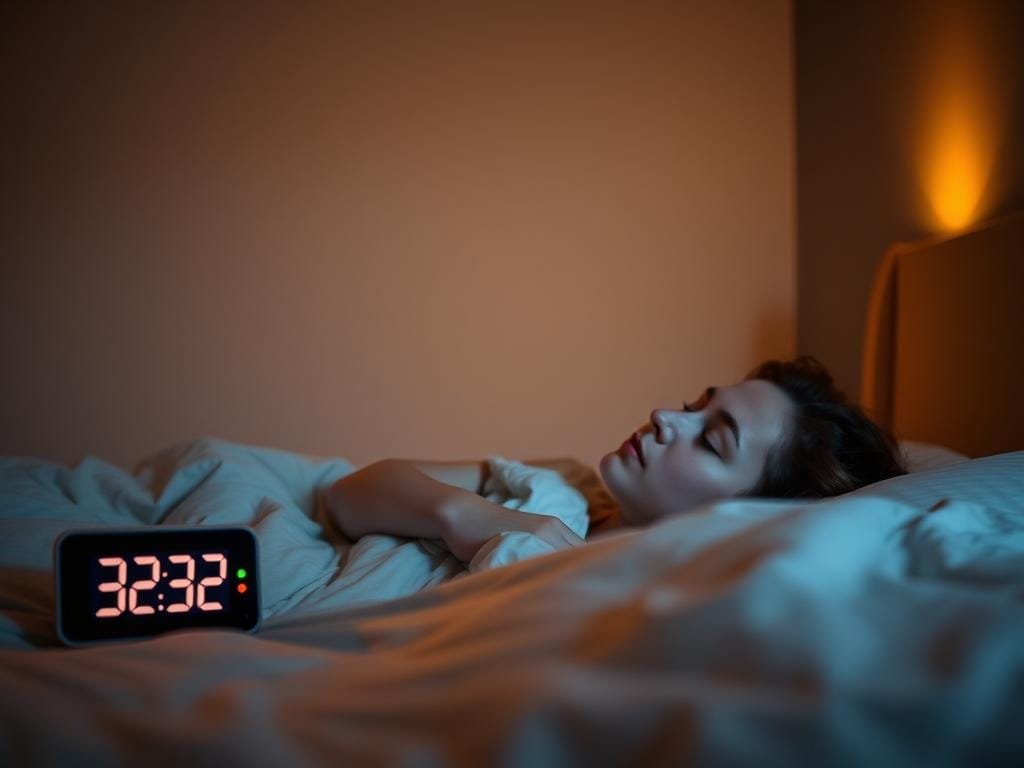Getting a good night’s sleep is as important as exercising and eating right. Poor sleep can harm your brain, mood, heart, and immune system. You can improve sleep quality by making a few simple changes to your daily routine.
Setting a regular sleep schedule and making your bedroom sleep-friendly are key tips for better sleep. In this article, we’ll explore 10 natural ways to enhance your sleep quality tonight.
Sleep is essential for overall well-being, and making a few adjustments can significantly impact your rest. By incorporating these natural methods, you can wake up feeling refreshed and revitalized.
Table of Contents
Understanding the Importance of Sleep
Getting enough sleep is vital for a healthy life. It helps your body and mind stay in top shape. During sleep, your body fixes damaged cells and builds new ones. It also strengthens your immune system.
Sleep also boosts your brain’s function. This affects your mood, how well you think, and your overall happiness.
Why Sleep Matters for Your Health
Sleep is key to staying healthy. Not getting enough sleep can lead to serious diseases. For example, it can increase your risk of heart disease, diabetes, and obesity.
A study in News in Health shows sleep’s importance. It also affects your metabolism, which can lead to weight gain and obesity.
Sleep’s impact on your health is multifaceted:
- Improves cognitive function and concentration
- Boosts immune system function
- Supports metabolic health
- Enhances athletic performance
- Regulates emotions and reduces stress
Effects of Sleep Deprivation
Not getting enough sleep can harm your health. It can make you less focused and increase your risk of heart disease. It also weakens your immune system.
Chronic sleep loss can cause depression and anxiety. It can also mess with your metabolism, leading to weight gain and diabetes risk, as seen in morning habits to boost metabolism.
| Health Aspect | Effects of Adequate Sleep | Effects of Sleep Deprivation |
|---|---|---|
| Cognitive Function | Improved concentration and memory | Impaired judgment and decision-making |
| Metabolic Health | Regulated appetite and metabolism | Increased risk of obesity and diabetes |
| Emotional Wellbeing | Better mood regulation | Increased risk of depression and anxiety |
The table shows the big difference between enough sleep and not enough. It highlights the need to make sleep a priority for your health.
“Sleep is the best meditation.” – Dalai Lama XIV
Establishing a Consistent Sleep Schedule
Your body loves routine, making a steady sleep schedule essential. This internal clock, or circadian rhythm, is controlled by light and darkness. It helps your body match the day-night cycle.
Benefits of a Consistent Sleep Schedule
Going to bed and waking up at the same time every day is good for your sleep. It helps your body’s internal clock work better. This makes it easier to fall asleep and stay asleep.
It also makes your sleep better, helping you rest and recover well.
Some key benefits include:
- Improved Sleep Quality: Being consistent helps your body get into a sleep routine, making your sleep better.
- Enhanced Alertness: Waking up at the same time daily boosts your alertness and energy during the day.
- Better Overall Health: A regular sleep schedule can lower the risk of health problems like heart disease and diabetes.

Tips for Sticking to Your Sleep Schedule
Keeping a consistent sleep schedule needs discipline and planning. Here are some tips to help you stay on track:
- Set a Realistic Bedtime: Pick a bedtime that lets you sleep 7-9 hours.
- Gradual Adjustments: If you need to change your sleep schedule, do it slowly. Adjust your bedtime by 15-30 minutes every few days.
- Establish a Bedtime Routine: Create a calming pre-sleep routine to tell your body it’s time to sleep.
- Avoid Naps: Try to limit or avoid naps, close to bedtime, to make sure you’re tired at night.
| Tip | Description | Benefit |
|---|---|---|
| Set a Consistent Wake-Up Time | Wake up at the same time every day, including weekends. | Regulates your body’s internal clock. |
| Create a Bedtime Routine | Do relaxing activities before bed, like reading or meditation. | Signals your body that it’s time to sleep. |
| Avoid Screens Before Bed | Limit screen time at least an hour before bedtime. | Reduces blue light exposure, promoting better sleep. |
By following these tips and understanding the benefits of a consistent sleep schedule, you can improve your sleep quality and overall well-being. Consistency is key to optimizing your sleep and waking up feeling refreshed and energized.
Creating a Sleep-Friendly Environment
Turning your bedroom into a sleep haven is key for improving sleep quality. A well-designed sleep space can greatly help you fall and stay asleep. This leads to better rest and recovery.
Optimal Room Temperature and Lighting
To make your bedroom sleep-friendly, control the temperature and light. Keep it at a comfy 65°F (18.3°C) for better sleep. Also, use blackout curtains to keep out external light and help your body’s clock stay in sync.
Dim red lights are better for sleep than bright white lights. Think about using them for nightlights or alarm clocks.
Reducing Noise for Better Sleep
It’s important to cut down on outside noise for a good sleep environment. Use earplugs, white noise machines, or soundproof your room. For more tips, check out the National Sleep Foundation’s guide.
Choosing the Right Bedding
The right bedding can really improve your sleep. Pick a comfy mattress and pillows that support your body well. Think about the material and how breathable your bedding is. This helps keep you cool in summer and warm in winter.
Investing in high-quality bedding can greatly improve your sleep and overall health.
Exploring Relaxation Techniques
Improving your sleep can be done through relaxation techniques. These methods calm your mind and body, getting you ready for sleep. Adding these techniques to your bedtime routine can greatly improve your sleep quality.
Mindfulness and Meditation for Better Sleep
Mindfulness and meditation are great for better sleep. They lower stress and anxiety, making it easier to fall asleep. Start with guided meditation apps or videos for relaxation exercises.
Mindfulness means being in the moment, focusing on your breath or a mantra. This calms your mind.
For more on mindfulness and its sleep benefits, check out tips for better sleep and relaxation techniques.
Deep Breathing Exercises
Deep breathing exercises are also effective for relaxation before bed. Slow, deep breaths calm your nervous system and reduce stress. Try breathing in through your nose for four counts, holding for seven, and exhaling for eight. Do this several times to relax.
Progressive Muscle Relaxation
Progressive muscle relaxation involves tensing and relaxing muscles. Start with your toes and move up to your head, holding tension for a few seconds before releasing. This technique helps release physical tension and promotes relaxation.
| Relaxation Technique | Description | Benefits |
|---|---|---|
| Mindfulness and Meditation | Practice being present and focused on your breath or a mantra. | Reduces stress and anxiety, improves sleep quality. |
| Deep Breathing Exercises | Focus on slow, deep breaths to calm your nervous system. | Reduces stress, promotes relaxation. |
| Progressive Muscle Relaxation | Tense and relax different muscle groups. | Releases physical tension, promotes relaxation. |
By adding these relaxation techniques to your bedtime routine, you can improve your sleep. Try different techniques to see what works best for you.

Limiting Screen Time Before Bed
Reducing screen time before bed is key to better sleep. In today’s world, it’s easy to get lost in screens before bed. But this habit can harm your sleep quality.

The Impact of Blue Light on Sleep Quality
Looking at screens and the blue light they give off can lower melatonin levels. Blue light makes your brain think it’s daytime, making it tough to fall asleep and reducing sleep quality.
Nighttime screen use can mess with your sleep. It lowers melatonin levels, making it hard to relax and get deep sleep. This is bad for sleep quality.
Effective Strategies to Reduce Screen Use
To fight screen time’s impact on sleep, try these tips:
- Set a “no screen” time before bed, ideally an hour or two.
- Use blue light filtering glasses, apps, or software that filter out blue light.
- Replace screen time with relaxing activities like reading, meditation, or deep breathing exercises.
- Make your bedroom a screen-free zone to associate it with sleep.
By following these habits, you can significantly improve your sleep quality. You’ll wake up feeling refreshed and energized. Better sleep habits take time and discipline, but they’re worth it for your health and well-being.
Diet and Its Role in Sleep Quality
What you eat can greatly affect your sleep. Eating foods rich in certain nutrients can help you sleep better. On the other hand, a bad diet can disrupt your sleep. It’s important to know how your diet impacts your sleep for sleep improvement strategies.
Foods That Promote Sleep
Some foods are better for sleep because of their nutrients. Foods high in tryptophan, like turkey and fish, help produce serotonin and melatonin. This makes it easier to fall asleep.
Complex carbs, such as whole grains and fruits, also help by boosting serotonin levels. For more on sleep-promoting foods, check out the Sleep Foundation’s nutrition page.
Other foods good for sleep include those with magnesium and potassium. Bananas, almonds, and dark leafy greens are examples. These minerals relax muscles and calm the nervous system, helping you sleep better.
Timing Your Last Meal
Eating a big meal before bed can mess with your sleep. Try to finish dinner 2-3 hours before bedtime. This allows for digestion and prevents discomfort.
Also, watch what you eat in the evening. Avoid spicy or acidic foods that can cause heartburn. If you’re hungry before bed, choose a light snack that’s easy to digest.
By focusing on your diet and making smart choices, you can use natural remedies for better sleep. This can improve the quality of your rest.
Incorporating Regular Exercise
Adding exercise to your daily routine can really help your sleep. It boosts sleep quality and health. Knowing how exercise affects sleep helps you plan your workouts better.
Physical Activity and Sleep Enhancement
Exercise is good for sleep. It can lessen insomnia symptoms and make sleep better. Experts say it improves all sleep aspects.
“Exercise is a great way to improve sleep quality. Regular physical activity can help you fall asleep faster and sleep more soundly.”
Exercise affects sleep in many ways. It can set your body clock, lower stress, and make you feel better. To get the most sleep benefits, think about when you exercise.
Best Times to Exercise for Better Sleep
When you exercise matters for better sleep. Exercise is good anytime, but timing affects sleep quality.
| Time of Exercise | Impact on Sleep |
|---|---|
| Morning | Can help regulate your circadian rhythms |
| Afternoon | Can improve sleep quality without interfering with bedtime |
| Evening | Can stimulate the body, potentially delaying sleep onset |
To not mess up your sleep, finish exercising a few hours before bed. This lets your body relax before sleep.
By adding regular exercise and paying attention to timing, you can better your sleep. This improves your overall sleep quality.
Managing Stress Levels
To get a good night’s sleep, managing stress is key. Stress can mess with your sleep, so finding ways to handle it is important. This can really help improve how well you sleep.
Recognizing Stress as a Sleep Disruptor
Stress can make it hard to fall asleep and stay asleep. It’s important to know the signs of stress. Look out for feelings of tension, anxiety, and trouble relaxing.
Techniques for Stress Management
There are many ways to manage stress. Here are a few:
- Mindfulness and Meditation: These practices help you stay in the moment and calm your mind.
- Deep Breathing Exercises: These calm your body and mind.
- Progressive Muscle Relaxation: This involves tensing and relaxing different muscle groups.
For more tips on stress relief, check out Hopkins Medicine. They have more resources to help you.
Utilizing Natural Sleep Aids
There are many ways to improve your sleep naturally. Herbal supplements like melatonin and valerian root can help. You can learn more about these supplements and how they aid in better sleep.
Herbal Remedies and Supplements
Herbal teas like chamomile and magnesium supplements can relax you. They help prepare your body for a good night’s sleep. Knowing how these work is key to better sleep.
Essential Oils for Sleep
Essential oils like lavender and bergamot can make your sleep space calm. Using them in a diffuser or on your skin can help a lot.
When to Consult a Sleep Specialist
If natural remedies don’t work, see a healthcare expert. They can find and treat sleep disorders. This is important for your sleep health.

